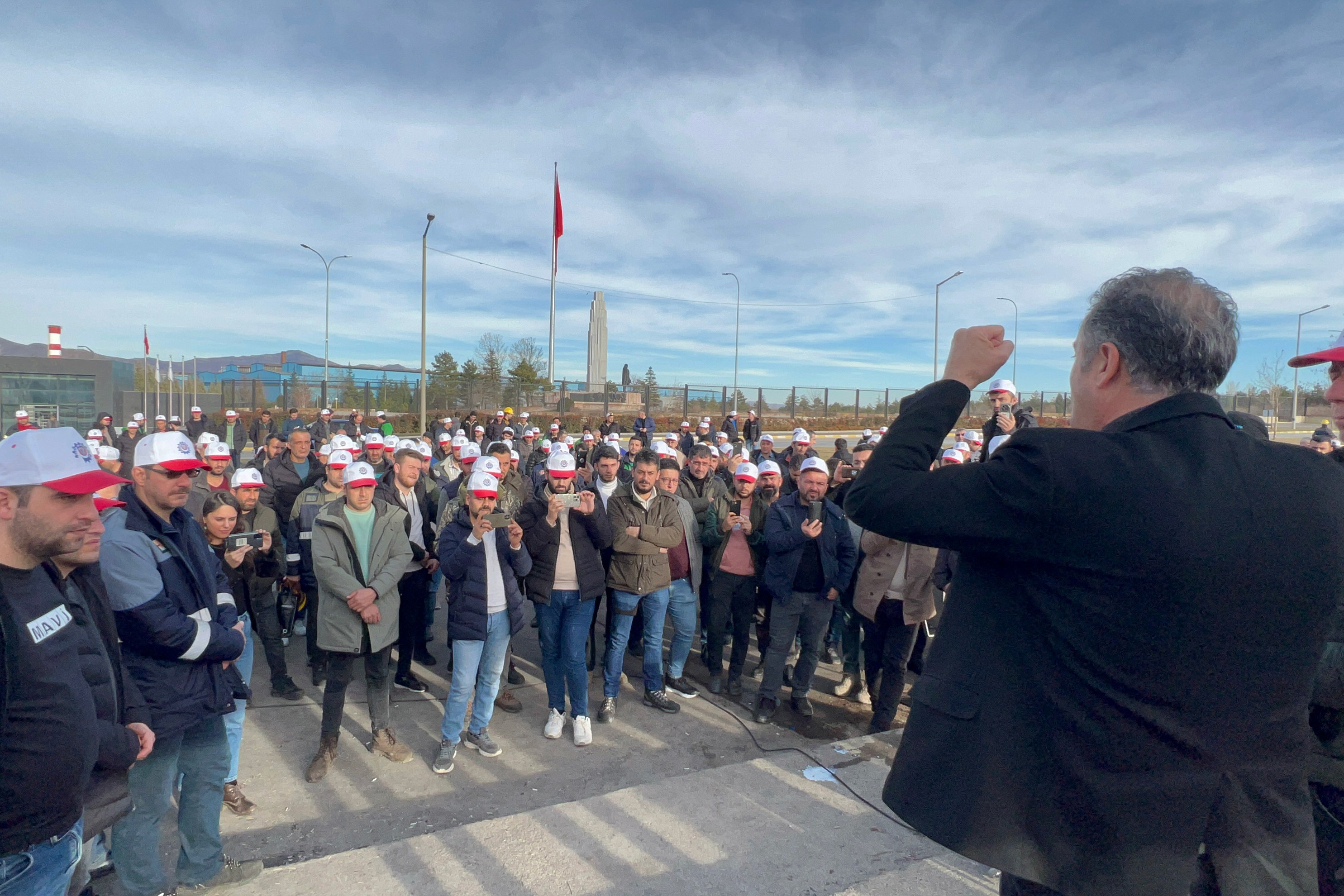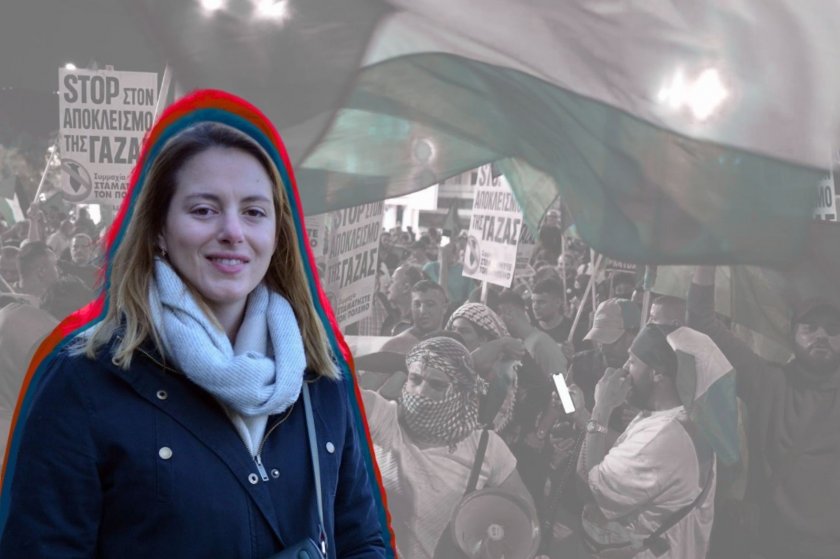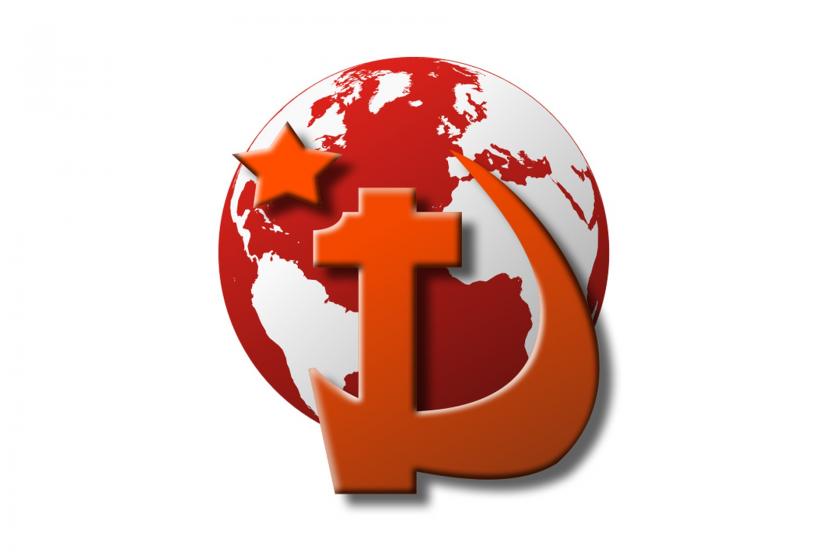Seydisehir Eti Aluminium workers in action
"The workers of Eti Alüminyum of Cengiz Holding have started a work stoppage and resistance that continues day and night. The workers are waiting with their wives and children by the fire they light at night".

Fotoğraf: Evrensel
Ekinsu Devrim DANIŞ
Konya
Nowadays, when we are in the middle of the local elections, the protests and marches of the public sector workers demanding tax justice and additional wage increases and the February wage increase protests from Urfa to Ankara, from Seydişehir to Antep are moving every day and all four corners of Turkey are being shaken by a wave that is coming from a wider base than it seems. The workers are mobilising to find their own way out.
In another link of this chain of actions, which continues at the level of individual workplaces, we are at the work stoppage initiated by the workers of Seydişehir Eti Aluminium against low wages. The workers, who say that their wages in the Top 500 factory in Konya are below the minimum wage, are demanding an increase of more than 100 per cent against the 56 per cent increase offered by the boss during the additional protocol process. The workers are continuing their resistance with their wives and children in front of the factory. The brothers and sisters of the workers who joined them at the change of shifts, saying "We want our rights, not charity", the mountain in the background with all its majesty "He who leaves doesn't come" and the fire of action that mixes the common sense of struggle in the middle of the workers, where they joke and chat and get closer to each other day by day...
WHY CAN'T OUR VOICES BE HEARD?
I also kneel by a fire where young workers are standing together. On the third day of their protest, the workers read a message from the factory management: "Workers who disrupt production by slowing down work will lead to the loss of our country's national wealth and the victimisation of our workers. Workers who continue to slow down work and absenteeism will be subject to immediate dismissal by the employer for just cause in accordance with Article 25 of the Labour Law".
Orhan, a worker from Seydisehir said, "Are we committing a crime now? They say that you will continue to be slaves and Konya's economy will develop. What kind of logic is that? The workers will be paid for their labour so that the country's economy will grow".
Other workers interrupt Orhan's words and nod in agreement. In one fell swoop, the workers turn the narrative of economic growth based on the exploitation of cheap labour on its head. "If the workers are paid a living wage, that is, if the workers grow, the economy will grow. Then our purchasing power will increase, tradesmen will be relieved, Seydişehir will develop. The national wealth will also grow".
The majority of the workers, on the other hand, hope that the enthusiasm of experiencing such an action for the first time will lead to quick wins. Talking to İskender Bayhan, a Labour Party deputy from Istanbul, who came to visit them, the workers asked: "Why doesn't our voice reach the top? Haven't they seen our actions yet? Since Erdoğan has the sole authority, they say, doesn't Cengiz have a say? The workers think that if their voices went "upstairs" or were more prominent in parliament, their demands would be accepted in a flash. At this point, we ask the workers if they are following the protests and strikes in factories in other cities. The workers say that they are aware of the actions of the Özak Tekstil workers on social media, but that they need to be informed more.
THE POINT OF REVOLT, EVEN WORKING TWO JOBS IS NOT ENOUGH
A few days before the workers' protest in Konya, farmers had marched in a convoy of tractors and cars to the Seydibey potato factory to protest against the transfer of the production quota to another district. The workers we interviewed outside the factory said they had also taken part in this protest, and that almost all the workers were still tied to the land and earned extra income from farming. When I asked them what was the last straw at the factory, where worker turnover is also limited, they mentioned this point. They explained that they had been able to make ends meet by working two jobs, but with the increase in the price of diesel and rising costs, it was no longer possible to make ends meet even with two jobs.
Kenan from Seydisehir, a worker who has been at the factory for about 10 months, chimes in: "I'm young, young. Why do I have to work in the fields after my shift? Why can't I go to the beach in Manavgat, which is an hour away? Everyone works in the fields. Sometimes we fall asleep because we are tired or absent-minded. Then we take care of each other. We say: 'You rest, I'll take care of it.
Kenan lost his father to an occupational disease caused by the harsh working conditions in the factory and the heavy metals he inhaled. He also remembers the protests that preceded the privatisation of Eti Alüminyum. He was 9 years old when he and his father took part in the protests against the privatisation... "The conditions of slavery continue from father to son, but the struggle is long. And now we are here," he says.
Mehmet, who has worked at the factory for 17 years, continues: "I have two daughters. She loves reading books. She always orders new books from me via Whatsup". At this point he shows me his correspondence and the list of books he wants to read. "It's so embarrassing to go home and say, 'Girl, I didn't get it. As a father, I can't even buy my daughter the book she wants. We don't want this factory to go bankrupt, to close down, or for us to live in luxury... Our demand is as human and basic as buying books for our children.
Like Kenan, he compared the conditions of the past with the present and said: "In the past, we used to gather in a car and go swimming in Manavgat with our wives and children. Now we get together and go to the fields. In short, I want to live like a human being. Since we cannot work humanely, we cannot live humanely".
DON'T THINK THAT THE UNION STARTED THE ACTION'.
The workers in the factories of Konya Organised Industry, especially in Seydişehir Eti Alüminyum, are mostly religious conservative workers who voted for the AKP. In the factories where there are trade unions, the trade unions affiliated to Hak-İş are organised, although this varies according to the sector. There are also representatives of Özçelik İş among the group we talked to. Almost all the workers we met emphasise that they are continuing this action despite the trade unionists. "It should not be assumed that the union started this action. They got scared when we rejected 56 per cent. They were afraid that we would change the union too. They are here with us out of necessity," says one worker. Just then a representative walked by: "So this is our representative, woe betide you," they joke. They explain that the union collects around 900 lira in dues from them every month, but does not do its job. Meanwhile, Konya's famous meat loaf is being distributed to the workers. The workers immediately take a swipe at the unionists, saying: "Let's at least eat a lot of it so that we can at least pay the dues we pay. A group of workers I interviewed said: "Let's solve this wage increase and we will send them away, God willing. Step by step, without rushing, we need to build a force that can change the union.
THE 'SPECIAL SITUATION' TOGETHER
Factors such as the fact that the workers in Seydişehir live in nearby villages, have a common social environment where they spend time outside work, and have been working in the same factory for a long time, have created a special situation in the relationship of trust and solidarity that the workers have established among themselves compared to factories in other cities. When explaining the fact that some of the workers continued to work after the first day's protest, the workers do not attribute this to the fact that they complained, grumbled or condemned those who held back, but rather to the fact that their protest was not visible to the public in the first days. The Seydişehir workers also understand and sympathise with the feelings of their colleagues who are worried and anxious about the dismissals, and if they are, the Seydişehir workers do not look for the reason in the individual behaviour of these workers but in the whole movement. "If they had told us a few days ago that we would protest by setting up a stove in front of the factory, we would not have believed it," the workers say, adding that the action was completely unplanned and spontaneous. "You know how you keep a calf in a stable all winter, and when you let it out in the summer it grows and thrives, that's what we've become," they say. As we continue our conversation, we hear a song the workers are singing: "You eat the rights of the poor, then you say it's the law and you don't like the man. Stop boss, stop!"
THE CORE GROUP FORMS
Everything depends on how they will twist Cengiz's ankle... For the Seydisehir workers, who have sacrificed all the time and tried all the ways to survive, it is very important to come out of this resistance with a victory for the future contract period. That is why they say: "After all this time, we came together and said: 'Stop Cengiz! If we come out of here defeated and scattered, it will be very difficult to bring all these workers together again". The workers know up to which point their unity will last and in which situation the contradictions can create a qualitative leap in relation to their own strength... This organised reaction, in which the dissatisfaction and the anger are growing day by day, also makes it necessary to plan the next process step by step, taking into account the moves against the foot games of the management and the trade unionists. A core group is already forming around the militant, leading workers that the movement has brought to the fore...

EMEP MP İSKENDER BAYHAN ADDRESSED THE WORKERS OF ETİ ALÜMİNYUM: "YOUR STRUGGLE GIVES HOPE FOR TOMORROW".
Labour Party deputy İskender Bayhan and a delegation from EMEP paid a support visit to the resisting workers.
Bayhan greeted the workers with the words "This just cause is the cause of the working class to protect their labour, the sweat of their brow and the future of this country".
Expressing his protest against Cengiz Holding's threat of dismissal with a notice according to Article 25/2 of the Labour Law, Bayhan said, "I once again call on the Labour Minister Vedat Işıkhan: These are criminal documents. These are threats made by the capitalists of this country because the workers demand their rights, because the workers claim their labour and voice their demands, because they exercise their rights written in the constitutions through struggle and these are the biggest crimes of capital. Capital is the greatest terror in this country. It is the terror of exploitation. Why don't you take the necessary measures against it?"
"WHY IS YOUR POWER NOT ENOUGH FOR CENGIZ?"
"Why is your power not enough for Cengiz Holding, which is threatening to sack workers? Is your power only enough for workers and labourers?" Bayhan asked, "But feet become heads, when workers and labourers demand their rights in this country, heads and feet will change places. Therefore, the first thing that Vedat Işıkhan should do is to send 3 inspectors here to prepare reports to stop the injustice that is being done to these workers and labourers and to stand by the rights of the workers and labourers".
"LIKE MANY CAPITALIST GOVERNMENTS, THEY WILL BE HISTORY."
"Or do you know what will happen?" Bayhan continued, "They will become history like many capitalist governments before them. For the first time in this country, the working class and labourers will not see a wave coming from below to get their rights. This has happened many times in history. Those who did not give the workers their rights in the face of this have lost and collapsed. The working class buried the Özal government in history by saying 'The fat man of Çankaya is an enemy of the workers'. The working class buried the Çiller government in history by saying: 'You said 'sister, sister, sister, you ate our rights'. The 2001 crisis was blamed on the workers and the Ecevit-Bahçeli-Yılmaz coalition was buried in history by saying 'Down with the IMF government, wolf, bird and bee'. And you came to power on their backs. If you do not give the workers their rights, one day the working class in Seydisehir, Mitas, Antep, Gebze, Kayseri, Istanbul, Izmir will rise up and say: 'We will make Beştepe'nin uzunu, Aksaray'ın uzunu throw dust'. The working class is the real owner of this country. Workers and labourers are the real citizens who produce the values of this country. If you don't give them their rights, it means that you don't own the country," he said and the workers showed their reaction by applauding enthusiastically.
Bayhan criticised Cengiz Holding's claim that "this is national wealth, national value" and said: "In other words, Cengiz Holding's tens of millions of dollars of profit and billions of liras of goods are national value. But there are 30 million workers and labourers in this country. If these workers are not the people and nation of this country, how can you, as a handful of capitalists, declare yourselves to be the representatives of the national value and wealth of this country? Bayhan said, emphasising that the real value is the workers.
İskender Bayhan said: "The name of this is this: We will keep all the wealth of this country in our hands, no matter what they call national, local. And you, as wage slaves, as those who have to sell their labour at the cheapest price, as honourable citizens of this country, you will not raise your voice".
Forwarding to the next article...
10 seconds remaining






Follow Evrensel